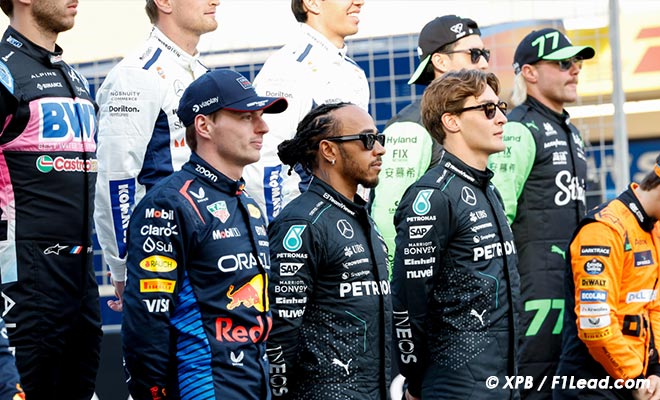Amidst the glitz of Formula 1, drivers find themselves at a crossroads, navigating between allegations of ‘sportswashing’ in Saudi Arabia and the complexities of the Horner affair, spotlighting the sport’s ethical and political challenges.
Is Saudi Arabia using F1 as a platform for ‘sportswashing’ to project a rejuvenated, though possibly misleading, image of the Wahhabi Kingdom?
Simultaneously, isn’t F1 also a part of the Kingdom’s extensive strategic communication plan to smooth over its image? Are the drivers themselves aware of participating in a sort of country-scale marketing operation?
For Charles Leclerc of Ferrari, there’s nothing new under the sun: F1 has always lived under the shadow of potential exploitation…
Moreover, F1, currently mired in the Horner affair, might not be in the best position to preach to the world…
“As a sport, and we’ve always said this, we must bring the values of the sport to the countries we race in, to open people’s minds. However, it’s clear we’re in a very delicate period for our sport [referring to the Horner affair]. We should focus on better sharing the positive values we uphold – and there’s still a lot of work to do on this front, as we see now.”
“But I am convinced that we are 20 drivers showing good values, like respect. We need to continue going to these countries to open minds and help them have a better future. Also to inspire the youth to follow their dreams. And I still believe that this is a good thing, anyway.”
Max Verstappen has never been much interested in political matters, unlike, for example, Lewis Hamilton.
However, the Milton Keynes driver has discussed the topic more than usual, in the Jeddah paddock…
“With sport in general, there’s a lot we can achieve all over the world. We’re of course showing ourselves here to a new, young audience. But we don’t do politics. That’s a whole other story. And it’s very important that sport remains sport, and politics remains politics.”
“Sometimes, people like to mix all this up. I prefer to focus on the sport. Otherwise, I would have gone into politics. But that’s not my area of expertise nor is it what I want to do. In the end, every country has its own flaws, but also its positives. We’re not going to change the world as a sport, but we try to share positive values.”
“And then, of course, it’s also up to the country to make positive changes. Since we’ve been here, there have been very beautiful positive changes, and that needs to be respected, even if sometimes it takes a bit more time in certain countries. But it’s very positive, and yes, it’s wonderful to see and also to encounter a new culture so that everyone is educated on this matter, because everyone is a bit different everywhere in the world, wherever you go, and that needs to be respected too.”
“But of course, no matter where you come from, in your country, there are always things that can be improved, right? So, it’s generally a work in progress.”
Saudi Arabia’s charm offensive certainly works, as Max Verstappen, for instance, would like to explore the Al-Ula site, where the Dakar Rally has also passed (F1 isn’t the only sport involved in ‘sportswashing’ issues, of course)…
“I’ve only been to Jeddah. The country is so large. I think there are many places I’d like to visit. Many of my friends have also visited the capital, Riyadh, or even Al-Ula. The Dakar Rally, of course, takes place here. So, there are many beautiful images that one can see. They’re building a new city – Qiddiya – and there are so many exciting projects happening. So yes, it’s great to see the country opening up a bit more to the world. And that’s the only thing one can wish for, really. So, I hope the whole world can discover a bit more about Saudi Arabia.”
For Max Verstappen’s teammate, Sergio Pérez, F1 is also capable of contributing to positive change in the countries it visits.
“Formula 1 itself is a large platform that provides the opportunity for new countries to showcase themselves – and you know the whole world is watching once you’re in Formula 1. It’s really, really good. It’s a very beautiful opportunity for all these new countries coming into the sport. And as a product, we are very unique. You have 20 drivers, of different nationalities, great athletes with great values, and it’s something that helps all these countries to showcase themselves and try to continue to improve and evolve. As always, every country can improve, but it’s always important to be able to give back to the people what they have given.”
F1 and Saudi ‘Sportswashing’: A Complex Tale. F1 and Saudi ‘Sportswashing’: A Complex Tale
- Scouting Red Bull’s Brain Trust: Ferrari’s Strategic Move
- Following us on Facebook and Twitter.
- Norris rues Saudi crash, eyes lucky break on Sunday
- Sainz Stuns with P6 in Jeddah as Williams Gains Ground
- Bearman Impresses in Jeddah as Ocon Fades in Q1 Exit
- Antonelli Impresses with P5 on the Grid in Jeddah
- Sauber’s Jeddah hopes sink after double Q1 heartbreak
